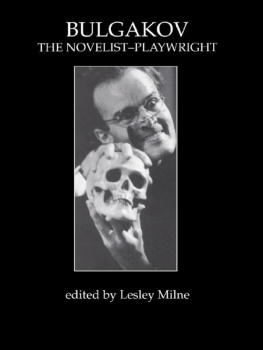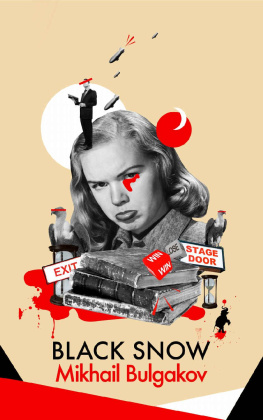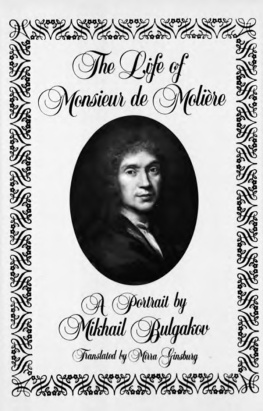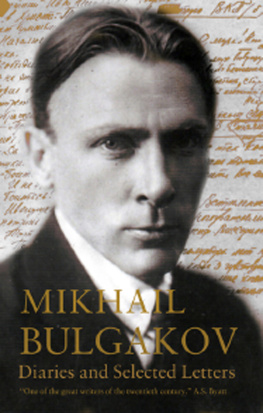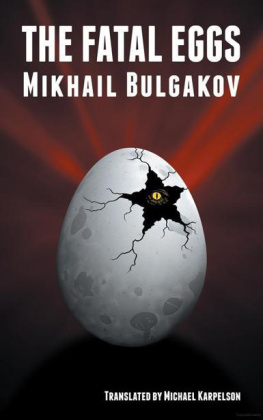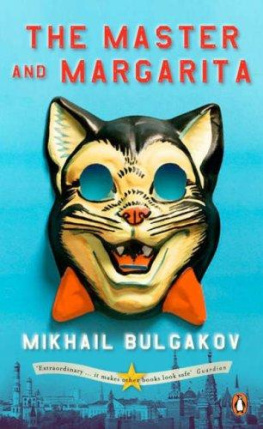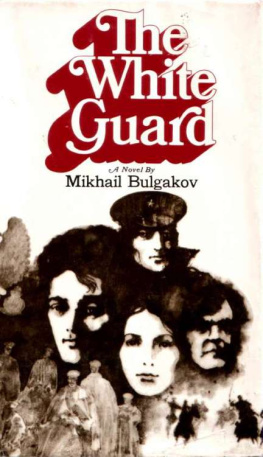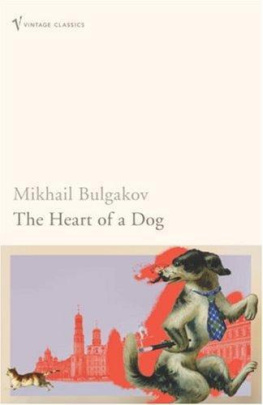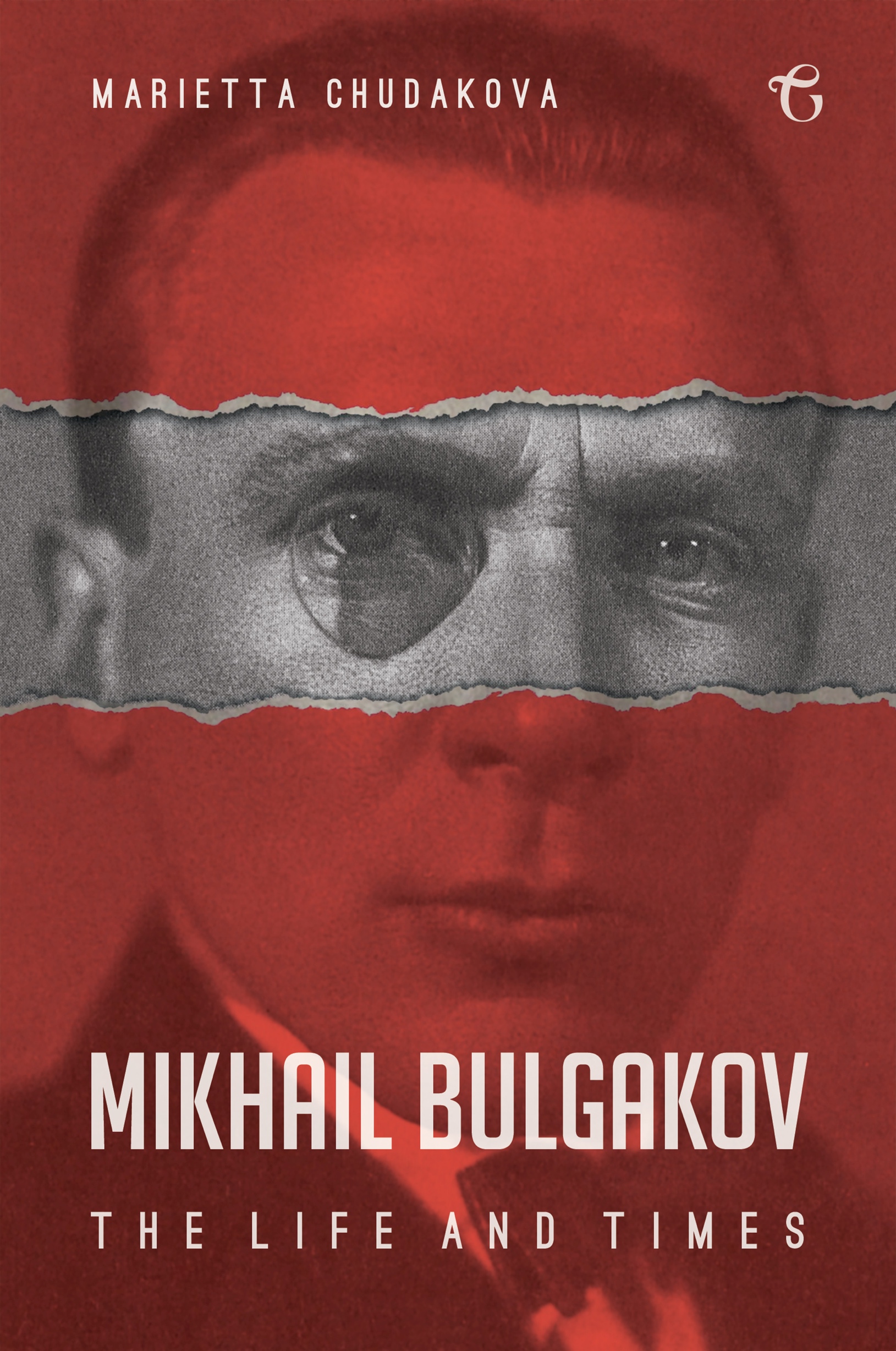
Mikhail Bulgakov
The Life and Times
Marietta Chudakova
Glagoslav Publications
Contents
Untitled
Table of Contents
MIKHAIL BULGAKOV:
THE LIFE AND TIMES
by Marietta Chudakova
Translated from the Russian by Huw Davies
1988, 2019 by Marietta Chudakova
Published by arrangement with ELKOST Intl. Literary Agency
Published with the support
of the Institute for Literary Translation, Russia
Introduction 2019, J.A.E. Curtis
Proofreading by Kevin Bridge
Publishers Maxim Hodak & Max Mendor
2019, Glagoslav Publications B.V.
www.glagoslav.com
First published in 2019 (abridged)
ISBN: 978-1-78437-980-3
A catalogue record for this book is available from the British Library.
This book is in copyright. No part of this publication may be reproduced, stored in a retrieval system or transmitted in any form or by any means without the prior permission in writing of the publisher, nor be otherwise circulated in any form of binding or cover other than that in which it is published without a similar condition, including this condition, being imposed on the subsequent purchaser.
Introduction
Marietta Chudakova and Mikhail Bulgakov: The Life and Times
In order to understand the huge importance that this biographical study of Mikhail Bulgakov written by Marietta Chudakova had when it was first published in 1988, we need to remind ourselves of the difficulties which faced literary scholars and other intellectuals in the late Soviet period. Since the death of Stalin in 1953 the USSR had gone through a period of cultural Thaw, a period when it had become possible to denounce Stalin (in official circles, but only behind closed doors) for his crimes against members of the Communist Party, but not to spell out in full the extent of the criminal horrors perpetrated against the Soviet people as a whole during the Terror. The Thaw period initiated by Nikita Khrushchevs secret speech, which revealed Stalins actions to the XXth Party Congress in 1956, was only ever a partial thaw. True, in 1962 the sensational publication of Solzhenitsyns short novel One Day in the Life of Ivan Denisovich had for the first time lifted the veil of silence which had up until that moment concealed the history of the Gulag from public view. But this brief glimpse of life in Siberian labour camps did not signal the opening of floodgates, and it was not followed by a rush of other such publications. On the contrary, literary censorship seemed to regroup and reassert itself, and further controversial works by Solzhenitsyn and others failed to be granted permission to be published.
This largely repressive regime continued under Khrushchevs successor, Leonid Brezhnev, who from 1964 onwards came to preside over what is now known as the era of stagnation, when Soviet Communism became more and more bureaucratic at home, while its foreign policy came to be defined by the aggressive and wary attitudes of the Cold War. As often as a relatively outspoken or liberal work of literature was published, so equally often were intellectuals harassed or put on trial for spurious offences: and so the dissident movement was born, with liberally-inclined intellectuals banding loosely together to outwit the authorities where possible, often with the connivance - or at least the tacit encouragement - of westerners interested in Soviet culture.
One such figure on the literary scene was Marietta Chudakova, who joined the staff of the Manuscript Department of the Lenin Library (now known as the Russian State Library) in 1965, after completing her literary studies at doctoral level at university. Not long after this the Library acquired a sizeable archive from Yelena Sergeyevna Bulgakova, the third wife of the writer Mikhail Bulgakov. After a career which had sparkled into celebrity in the mid-1920s, when he had been the most controversial and sought-after playwright in the early years of the Soviet rgime, Bulgakov had suffered increasing defeats as he attempted to publish or stage further works. By the time he died of a hereditary disease of the kidneys in 1940, at the early age of 48, he had become entirely frustrated in his literary endeavours. He had also come under the close and personal scrutiny of Stalin and other members of the Politbiuro, who on several occasions discussed whether to permit his works, but regularly concluded that they were too subversive. Bulgakov was perhaps lucky to escape the physical torments of the Terror, but his reputation as an essentially anti-Soviet figure remained after his death. Through the years of World War II in Soviet Russia (1941-45), and until well after Stalins death, he was virtually written out of literary history, and there could be no question of publishing his many unpublished works. Yelena Sergeyevna, like other literary widows in the USSR, devoted herself to the courageous and difficult task of gathering his papers and manuscripts together and preserving them discreetly, in the hope that his works might eventually see the light of day.
This situation began to change, however, with the Thaw. By the mid-1960s a quarter of a century after the authors death - a number of his works, including several of his plays, had at last been published. The next most exciting event of the Thaw after the 1962 publication of Solzhenitsyn was the publication for the time being only in part of two portions of Bulgakovs masterpiece The Master and Margarita by the journal Moskva, in late 1966 and early 1967. It would take until 1973, however, three years after Yelena Bulgakovas own death, for the novel to be published in full, in a volume also containing his earlier novel The White Guard and his unfinished Theatrical Novel. This was the literary sensation of the decade, which launched the cult following of Mikhail Bulgakov and his works which has persisted to this day, very belatedly turning him into Russias most popular writer of the twentieth century.
Marietta Chudakovas task, after the acquisition of the archive around the time of the Moskva publication, was to sort and catalogue the manuscripts, letters and papers in the archive. This was an enormous responsibility, which she undertook with passion and ferocious dedication. It involved her in unceasing investigation, over many years, of the context of these documents, to establish the biographical facts which lay behind the events alluded to, and to trace the writing history of Bulgakovs entire oeuvre. She not only applied to the task her own extraordinary erudition and knowledge of the literary scene in the 1920s and 1930s, but she also undertook numerous trips to interview surviving members of Bulgakovs family, contemporaries of his dating back to Bulgakovs schooldays in Kiev in the 1890s and the early part of the twentieth century, and literary figures who had known him personally. She also got to know all three of Bulgakovs wives, eliciting from them candid and illuminating stories of their lives with this brilliant - but not always easy - man.
Chudakovas task as an archivist in the late 1960s and early 1970s was to write up her investigations in scholarly form, as a description of the archives contents according to the exacting library conventions of the day. Strictly speaking, she was not meant to stray into biographical narrative, or to offer any evaluative commentary on the works. But with a writer of this calibre the norm would have been to make appropriate references to already published biographies or interpretative studies, whereas in this case none had yet been written, so there was nothing else for her to refer to. And so she found herself essentially writing his biography as she went along, compiling as she did so an astonishing resource for herself in the shape of an exhaustive chronology of his life. Some moments remained unexplained for the moment, however. As she once reported it, she was obliged in this extremely lengthy article about his archive, published in 1976, to state simply that in 1920 Bulgakov had lived in the town of Vladikavkaz, in the northern Caucasus. Neither Bulgakovs sister Nadya nor any of his three wives was prepared to tell her what he was doing there, for fear of the possible repercussions even several decades later; for, as it subsequently emerged, Bulgakov had gone there with the White Army to serve as a medical officer during their retreat from the advancing Bolsheviks. And so Chudakova genuinely didnt know the answer to this question at that point. She also spoke very entertainingly about how long it took her even to get the 1976 article past the censors. For example, she needed to allude to the presence in the archive of the manuscript of Bulgakovs wonderful satirical tale The Heart of a Dog, but that text had not yet been licensed for publication in the USSR (it had appeared in the West in 1968), and so she was not allowed to mention its title. In the kind of discreet game-playing so characteristic of the courageous scholarship of Soviet academics at that time, she simply decided to smuggle a description of this archival item into her article by inconspicuously starting to talk about it as Bulgakovs third tale - and although on this occasion the censor did notice what she had been up to, he eventually conceded that this reference could stay in. The same schizophrenic attitudes were apparent when it came to providing specific references to catalogue numbers of the archive: Chudakova and others went to enormous lengths in a series of publications during those difficult years to smuggle in occasional specific mentions to catalogue references, so that other scholars could have some hope of tracking down the relevant item.
Next page

